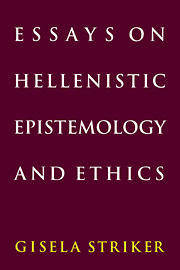Book contents
- Frontmatter
- Contents
- Preface
- Acknowledgments and essay sources
- List of abbreviations: Frequently cited names and titles
- EPISTEMOLOGY
- 1 Methods of sophistry
- 2 Kριτήριον τῆς ἀληθείας
- 3 Epicurus on the truth of sense impressions
- 4 Sceptical strategies
- 5 The Ten Tropes of Aenesidemus
- 6 On the difference between the Pyrrhonists and the Academics
- 7 The problem of the criterion
- ETHICS
- Name index
- Index of passages cited
2 - Kριτήριον τῆς ἀληθείας
Published online by Cambridge University Press: 05 June 2012
- Frontmatter
- Contents
- Preface
- Acknowledgments and essay sources
- List of abbreviations: Frequently cited names and titles
- EPISTEMOLOGY
- 1 Methods of sophistry
- 2 Kριτήριον τῆς ἀληθείας
- 3 Epicurus on the truth of sense impressions
- 4 Sceptical strategies
- 5 The Ten Tropes of Aenesidemus
- 6 On the difference between the Pyrrhonists and the Academics
- 7 The problem of the criterion
- ETHICS
- Name index
- Index of passages cited
Summary
INTRODUCTION
The epistemological debate between the Greek philosophical schools of the third and second centuries B.C. – the Skeptics on the one hand and the Stoics and Epicureans on the other – can be described without undue simplification as a dispute over the question of the criterion of truth. Strictly speaking, there were two questions: first, whether a criterion of truth exists, and second, what it might be. These questions can also be formulated without the expression “criterion of truth”: the debate centered on the question of whether it is possible to distinguish with certainty between true and false opinions or assertions, and if so, by what means. The Stoics and Epicureans defended the view that it is possible to make such a distinction, but differed over how it might be made. The Skeptics, on the other hand – Academics as well as “Pyrrhonists” – claimed that there is no criterion of truth, and that it is therefore impossible to distinguish between true and false opinions. From this they drew the well-known conclusion that it is impossible to know anything with certainty and hence it is necessary to refrain from any definite assertions.
Even though the problems which were at issue can be formulated in different ways, it seems obvious that we cannot properly understand or evaluate the way in which the Hellenistic philosophers put the question and attempted to answer it without first clarifying the sense of the question of the criterion.
- Type
- Chapter
- Information
- Essays on Hellenistic Epistemology and Ethics , pp. 22 - 76Publisher: Cambridge University PressPrint publication year: 1996
- 8
- Cited by



